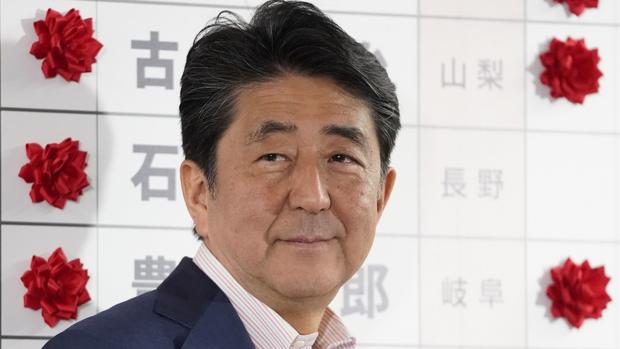 In this July 21, 2019 file photo, Shinzo Abe, Japan's prime minister and president of the Liberal Democratic Party (LDP), reacts after placing a red paper rose on a LDP candidate's name to indicate an election victory at the party's headquarters in Tokyo, Japan. (PHOTO / BLOOMBERG)
In this July 21, 2019 file photo, Shinzo Abe, Japan's prime minister and president of the Liberal Democratic Party (LDP), reacts after placing a red paper rose on a LDP candidate's name to indicate an election victory at the party's headquarters in Tokyo, Japan. (PHOTO / BLOOMBERG)
TOKYO - Japanese Prime Minister Shinzo Abe, the nation’s longest serving premier, is set to resign, a person familiar with the matter said on Friday.
Public broadcaster NHK earlier said Abe, who has battled the disease ulcerative colitis for years, wanted to avoid causing problems for the government due to the worsening of his condition.
Japan has not suffered an explosive coronavirus outbreak, but a recent rise in infections has fueled concern that Abe is putting too much emphasis on the economy over health
Here are key elements of Abe’s record since returning to office in December 2012. He ended his first troubled 2006-2007 term as premier by quitting abruptly, citing ill health.
COVID-19 RESPONSE, SCANDALS
Japan has not suffered an explosive coronavirus outbreak, but a recent rise in infections has fueled concern that Abe is putting too much emphasis on the economy over health.
Abe has drawn fire for an initial response to the outbreak that critics called clumsy and, more recently, for a seeming lack of leadership, including few media appearances.
Dissatisfaction with his response, as well as scandals such as the arrest of a former justice minister and his lawmaker wife on suspicion of vote-buying, have eroded Abe’s ratings.
A Kyodo news agency weekend survey showed Abe’s voter support at 36.0 percent, down from 38.8 percent the previous month and the second lowest since he returned to office in 2012.
“ABENOMICS”
Abe’s signature “Abenomics” policies of bold monetary easing and fiscal spending ran into headwinds last year as the US-China trade war hit exports and a domestic sales tax rise hurt business and consumer sentiment.
Now the pandemic has triggered Japan’s biggest economic slump on record. A third straight quarter of declines knocked real gross domestic product (GDP) to decade-low levels, wiping out the benefits of “Abenomics”.
Critics have also said Abe relied too heavily on his monetary and fiscal policy without following through on a pledge of a “third arrow” of structural reform to achieve long-term growth despite a fast-ageing and shrinking population.
ALSO READ: Source: Japan PM Abe set to resign over worsening health
SECURITY
Abe bolstered defence spending after years of declines and expanded the military’s ability to project power abroad.
In a historic shift in 2014, his government reinterpreted the post-war, pacifist constitution to allow troops to fight overseas for the first time since World War Two.
The following year, legislation ended a ban on exercising the right of collective self-defence, or defending a friendly country under attack.
Faced with divided public opinion, however, Abe has not achieved his long-held goal of revising the US-drafted constitution by writing the Self-Defense Forces, as Japan’s military in known, into the pacifist Article 9.
PERSONNEL APPOINTMENTS
By creating a Personnel Affairs Bureau at the cabinet, Abe and his right-hand aide, Chief Cabinet Secretary Yoshihide Suga, gained greater control over appointments of bureaucrats, who for decades have dominated policymaking, shifting the balance of policy power toward politicians.
DIPLOMACY
Abe has cultivated warm personal ties with US President Donald Trump, averting worst-case outcomes on trade. He has overseen a cautious improvement in ties with China. Relations with South Korea turned frigid due to disputes over the wartime past.
READ MORE: How possible successors stack up if Japan PM Abe resigns
Abe has made little progress toward resolving a long-running feud with Russia over disputed islands seized by Soviet troops at the end of World War Two. The row has kept the two countries from signing a formal peace treaty ending the war.
Nor has Abe been able to settle a feud with North Korea over Japanese citizens kidnapped by Pyongyang’s agents in the 1970s and 1980s, an issue he put at the centre of his political career.


